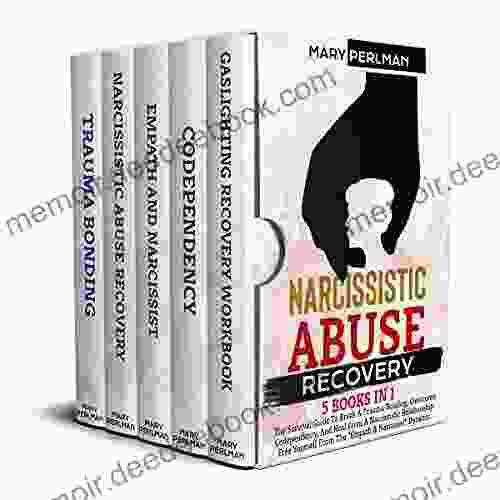The Survival Guide to Break Trauma Bonding, Overcome Codependency, and Heal from Complex Trauma

Are you struggling with the pain and confusion of trauma bonding, codependency, and the lasting effects of complex trauma? If so, you're not alone. Millions of people worldwide are grappling with these challenges, which can leave them feeling trapped, isolated, and unable to move forward in their lives.
4.3 out of 5
| Language | : | English |
| File size | : | 3742 KB |
| Text-to-Speech | : | Enabled |
| Screen Reader | : | Supported |
| Enhanced typesetting | : | Enabled |
| Word Wise | : | Enabled |
| Print length | : | 406 pages |
| Lending | : | Enabled |
This comprehensive guide is designed to provide you with the knowledge, tools, and support you need to break free from these harmful patterns and begin the journey of healing. We will explore the complex dynamics of trauma bonding and codependency, identify the signs and symptoms, and provide practical strategies for overcoming these challenges.
Understanding Trauma Bonding
Trauma bonding is a powerful psychological response to abuse that can make it extremely difficult for victims to leave or break contact with their abusers. It is often characterized by a cycle of idealization, devaluation, and reconciliation, which can leave victims feeling confused, emotionally dependent, and trapped.
There are a number of factors that can contribute to the development of trauma bonding, including:
- Intermittent reinforcement: Abusers often use a pattern of positive and negative reinforcement to keep their victims hooked. This can make it difficult for victims to recognize the abuse and to break free.
- Isolation: Abusers often isolate their victims from friends and family, making them more dependent on the abuser.
- Coercion and threats: Abusers may use threats or coercion to keep their victims in line.
- Self-blame: Victims of abuse often blame themselves for the abuse, which can make it difficult for them to seek help.
Breaking the Cycle of Trauma Bonding
Breaking the cycle of trauma bonding is not easy, but it is possible. Here are a few tips that can help:
- Recognize the signs: The first step to breaking the cycle of trauma bonding is to recognize the signs. These signs may include feeling constantly on edge, walking on eggshells around the abuser, and feeling like you can't live without the abuser.
- Set boundaries: Once you've recognized the signs of trauma bonding, it's important to set boundaries with the abuser. This means limiting contact, setting rules for communication, and refusing to tolerate abuse.
- Build a support system: Surround yourself with people who support you and who understand what you're going through. This could include friends, family, therapists, or support groups.
- Practice self-care: Self-care is essential for breaking the cycle of trauma bonding. This means taking care of your physical and emotional health, and setting aside time for yourself to do things that you enjoy.
Understanding Codependency
Codependency is a pattern of behavior that is characterized by an excessive reliance on others for emotional support and validation. People with codependency often put the needs of others before their own and may find it difficult to set boundaries or say no.
There are a number of factors that can contribute to the development of codependency, including:
- Childhood trauma: People who have experienced childhood trauma may be more likely to develop codependency as a way of coping with their emotional needs.
- Low self-esteem: People with low self-esteem may look to others for validation and support.
- Lack of healthy relationships: People who have not experienced healthy relationships may not know how to set boundaries or how to ask for help.
Overcoming Codependency
Overcoming codependency is a process that takes time and effort. Here are a few tips that can help:
- Identify your codependent behaviors: The first step to overcoming codependency is to identify your codependent behaviors. These behaviors may include people-pleasing, enabling, and rescuing.
- Set boundaries: Once you've identified your codependent behaviors, it's important to set boundaries. This means saying no to things that you don't want to do, and setting limits on how much you're willing to help others.
- Build healthy relationships: Surround yourself with people who support you and who respect your boundaries. This could include friends, family, therapists, or support groups.
- Practice self-care: Self-care is essential for overcoming codependency. This means taking care of your physical and emotional health, and setting aside time for yourself to do things that you enjoy.
Healing from Complex Trauma
Complex trauma is a type of trauma that is caused by repeated or prolonged exposure to abuse or neglect. Complex trauma can have a profound impact on a person's physical, emotional, and mental health.
There are a number of symptoms that may indicate that you have experienced complex trauma, including:
- Difficulty regulating emotions
- Difficulty forming and maintaining relationships
- Flashbacks and nightmares
- Physical health problems
- Mental health problems, such as depression, anxiety, and PTSD
Healing from complex trauma is a long and challenging process, but it is possible. Here are a few tips that can help:
- Seek professional help: A therapist can help you to process your trauma and to develop coping mechanisms.
- Join a support group: Support groups can provide a safe and supportive environment where you can share your experiences with others who understand what you're going through.
- Practice self-care: Self-care is essential for healing from complex trauma. This means taking care of your physical and emotional health, and setting aside time for yourself to do things that you enjoy.
Breaking trauma bonding, overcoming codependency, and healing from complex trauma are all challenging but possible journeys. By understanding the dynamics of these challenges and by implementing the strategies outlined in this guide, you can begin the process of healing and reclaiming your life.
Remember, you are not alone. There are millions of people who have overcome these challenges, and you can too. With courage, determination, and the right support, you can break free from the past and create a brighter future for yourself.
4.3 out of 5
| Language | : | English |
| File size | : | 3742 KB |
| Text-to-Speech | : | Enabled |
| Screen Reader | : | Supported |
| Enhanced typesetting | : | Enabled |
| Word Wise | : | Enabled |
| Print length | : | 406 pages |
| Lending | : | Enabled |
Do you want to contribute by writing guest posts on this blog?
Please contact us and send us a resume of previous articles that you have written.
 Book
Book Novel
Novel Chapter
Chapter Story
Story Library
Library Paperback
Paperback Newspaper
Newspaper Paragraph
Paragraph Sentence
Sentence Bookmark
Bookmark Bibliography
Bibliography Preface
Preface Synopsis
Synopsis Manuscript
Manuscript Codex
Codex Tome
Tome Bestseller
Bestseller Classics
Classics Narrative
Narrative Biography
Biography Memoir
Memoir Thesaurus
Thesaurus Narrator
Narrator Resolution
Resolution Librarian
Librarian Card Catalog
Card Catalog Borrowing
Borrowing Periodicals
Periodicals Study
Study Research
Research Scholarly
Scholarly Reserve
Reserve Academic
Academic Rare Books
Rare Books Special Collections
Special Collections Literacy
Literacy Study Group
Study Group Dissertation
Dissertation Book Club
Book Club Theory
Theory Jennifer Case
Jennifer Case Duncan Macvean
Duncan Macvean Krysia Jopek
Krysia Jopek Gail Green
Gail Green Carol Sicherman
Carol Sicherman Ashley Pearson
Ashley Pearson Janice Hardy
Janice Hardy Sarah Nooter
Sarah Nooter Piper Thibodeau
Piper Thibodeau Mary Gribbin
Mary Gribbin Juliet Foster
Juliet Foster Toni Cade Bambara
Toni Cade Bambara Kathryn Hughes
Kathryn Hughes John E Finn
John E Finn David Milgrim
David Milgrim Charles Reginald Haines
Charles Reginald Haines Rose Tremain
Rose Tremain Nahoko Uehashi
Nahoko Uehashi Stephen Saxton
Stephen Saxton Rachel Doyle
Rachel Doyle
Light bulbAdvertise smarter! Our strategic ad space ensures maximum exposure. Reserve your spot today!

 John ParkerThe Essential Guide to the New KS2 Mental Maths Daily Practice Book: Boosting...
John ParkerThe Essential Guide to the New KS2 Mental Maths Daily Practice Book: Boosting...
 Houston PowellUnveiling the Enchanting Allure of Mykonos: A Literary Journey with Max Allan...
Houston PowellUnveiling the Enchanting Allure of Mykonos: A Literary Journey with Max Allan...
 Gabriel HayesManaging Sport Facilities and Major Events: A Comprehensive Guide to Best...
Gabriel HayesManaging Sport Facilities and Major Events: A Comprehensive Guide to Best... Mitch FosterFollow ·8.7k
Mitch FosterFollow ·8.7k Vince HayesFollow ·16.8k
Vince HayesFollow ·16.8k W.B. YeatsFollow ·3.6k
W.B. YeatsFollow ·3.6k Chris ColemanFollow ·5.7k
Chris ColemanFollow ·5.7k Dustin RichardsonFollow ·18.2k
Dustin RichardsonFollow ·18.2k Jim CoxFollow ·17.9k
Jim CoxFollow ·17.9k Al FosterFollow ·18.7k
Al FosterFollow ·18.7k Fabian MitchellFollow ·6.6k
Fabian MitchellFollow ·6.6k

 Vernon Blair
Vernon BlairHow to Get a Woman to Pay for You: A Comprehensive Guide...
In the modern dating...

 Levi Powell
Levi PowellPrinciples and Theory for Data Mining and Machine...
Data mining and machine learning are two...

 Andrew Bell
Andrew BellMirrors For The Mind: Milestones In Discovery And...
Mirrors have been a part of human history...

 Alec Hayes
Alec HayesDelving into Natural Language Processing with Java and...
Natural Language Processing (NLP) is an...
4.3 out of 5
| Language | : | English |
| File size | : | 3742 KB |
| Text-to-Speech | : | Enabled |
| Screen Reader | : | Supported |
| Enhanced typesetting | : | Enabled |
| Word Wise | : | Enabled |
| Print length | : | 406 pages |
| Lending | : | Enabled |









